Emergency Orthodontist – Holliston, MA
Solutions Designed to Relieve Pain and Repair Smiles
The process of wearing braces of any kind involves making the right decisions and taking the appropriate steps to not only ensure positive and life-changing results but to also reduce the risk of orthodontic emergencies. From broken brackets and loose wires to increased pain and soft tissue irritation, our team here at Simply Orthodontics is here to provide immediate care when you need it most! When attempting to find an orthodontist in Holliston, you’ll be pleased to learn that Dr. Sam Alkhoury and Dr. Alan Carlotto can employ useful techniques and beneficial solutions that will address your problem, minimize delays, and get your smile back on track. If you would like to learn more about what you can do to reduce pain and avoid more serious orthodontic problems at home while waiting to see one of our qualified orthodontic specialists, contact us today.

Why Choose Simply Orthodontics Holliston for Emergency Orthodontic Care?
- Friendly & Experienced Dental Team
- Dental Insurance & Financing Accepted
- Same-Day Emergency Appointments Available
What to Do in an Orthodontic Emergency

The world might feel like it’s coming to a screeching halt when you experience an orthodontic emergency; however, there’s no reason to feel overwhelmed! No matter what your situation looks like, keeping a clear head and quickly jumping into action will always be in your best interest. Here are some steps you should follow:
- Call Our Office – If you’re unsure about what to do upon experiencing an orthodontic emergency, you should call us swiftly; we can easily help you assess the situation over the phone and walk you through whatever steps you need to begin taking. Typically, this includes things like rinsing out your mouth, applying orthodontic wax or taking over-the-counter pain relievers.
- Schedule an Appointment – If your situation requires professional assistance, we’ll be sure to pencil you in for a same-day appointment. Upon arrival, we can inspect your orthodontic appliance(s), as well as the rest of your mouth, and determine the best course of action.
- Get Your Smile the Help It Needs – We’ll often be able to address your situation immediately within our office, meaning that any discomfort you’re feeling will be quickly resolved. In some cases, a follow-up appointment might be necessary.
The Most Common Orthodontic Emergencies
If you’ve encountered a complication with your orthodontic treatment, whether you believe it to be an emergency or not, you should give us a call! It’s worth noting that most orthodontic emergencies can be handled at home, and over the phone, one of our team members can provide you with some expert assistance. However, you should never leave anything to chance. Listed below are some examples of a few common orthodontic emergencies and how you should handle them:
Understanding the Cost of Treating Orthodontic Emergencies
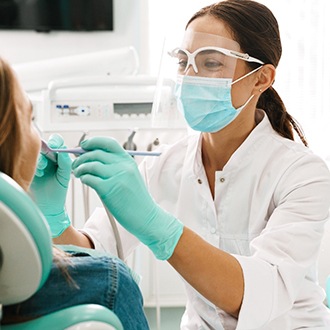
Believe it or not, there’s no actual “set” price for emergency orthodontic treatment. Some emergencies are relatively inexpensive to treat, while others may require complicated care, the need for replacement parts, or other things that can contribute to the total price. This means we can’t give you an accurate cost estimate until you’ve come in for your appointment, but rest assured, we’ll quickly provide you with urgent treatment if you need it and let you know what you can expect to pay. In the meantime, here are a few things to take into consideration concerning the cost of treating orthodontic emergencies.
Every Orthodontic Emergency Is Different
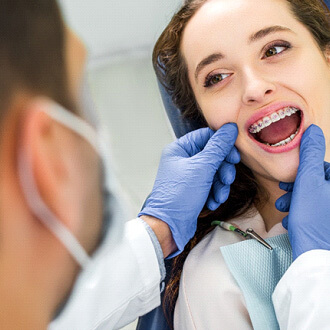
You should know that since every person has a unique smile and orthodontic treatment, technically speaking, no two orthodontic emergencies truly look the same. However, this doesn’t mean you should worry, as even the most urgent situations can be treated with our help. Better yet, most orthodontic emergencies don’t tend to be too severe or outright painful to begin with. But in any case, the very first thing we’ll do when you arrive at our office is quickly and carefully examine your situation, to determine the extent of the damage and what will be required to treat you. From there, we can review avenues of treatment and their associated costs and begin providing you with estimates.
Does Dental Insurance Cover Orthodontic Emergencies?
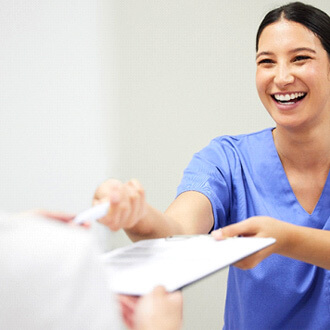
It’s normal for many dental insurance providers to offer some degree of coverage for orthodontic emergencies, but this coverage varies greatly from plan to plan. This is why it’s always wise to familiarize yourself with the details of your specific plan, so you aren’t hit with any surprises when it’s time to pay your bill. If your plan doesn’t provide any orthodontic benefits, it’s often possible to purchase supplementary orthodontic insurance – and you’ll be glad you have coverage when you need it. Of course, our team is always happy to review your plan with you to make sure you’re making the most of your coverage.
Other Options for Making Orthodontic Emergencies Affordable
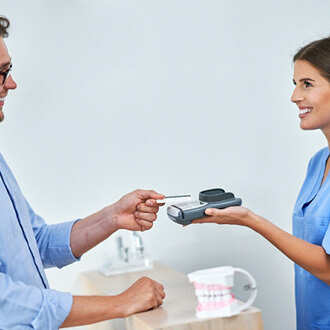
We understand that not every patient has access to orthodontic coverage in their insurance plans, but we believe that shouldn’t be a reason not to receive quality urgent care. That’s why we work with LendingPoint, a third-party financer that helps patients break up their total cost of care into manageable, low-interest monthly installments. We’re also thrilled to offer our patients in Holliston access to discounted orthodontic services through our Preferred Plan, allowing you to save potentially thousands of dollars on life-changing care while also providing you with priceless peace of mind. To learn more about how we can work with you to lower the cost of emergency orthodontic care, simply give our team a call and we’ll be happy to discuss your options.
Taking Care of Your Smile Can Save You Money

It’s true that some orthodontic emergencies result from unexpected, unavoidable accidents – life is unpredictable, after all! However, the vast majority of orthodontic emergencies can be avoided simply by being careful and closely following your orthodontist’s guidelines and making smart choices. For instance, avoiding hard or crunchy foods while you’re wearing braces will ensure that they don’t suffer needless damage. Likewise, avoiding eating while wearing clear aligners will ensure that they aren’t damaged. Above all else, be sure that you’re taking great care of your smile throughout your treatment too, since orthodontic emergencies are more likely to impact a smile that isn’t properly cared for.
Keys to Preventing Orthodontic Emergencies
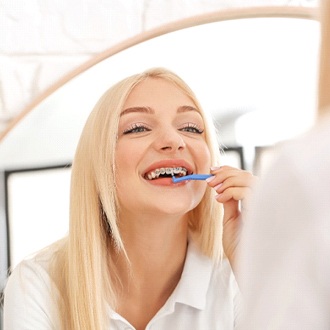
Naturally, knowing how you can prevent any of the previously mentioned emergencies is best. No one wants to experience the pain that occurs in these instances, which is why we’ve compiled some helpful tips that will work to reduce your risk of injury and keep your orthodontic treatment right on track:
Continue to Brush, Floss, and Rinse Regularly
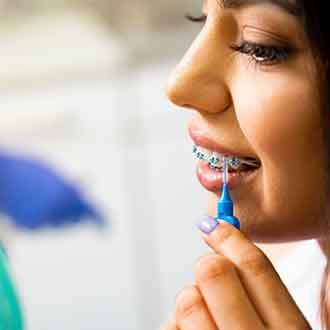
In order to eliminate the possibility of decay, cavities, and gum disease, you need to commit to a solid oral hygiene regimen. That starts with brushing your teeth after each meal and extends to flossing and rinsing with mouthwash each evening. If you have traditional braces and you’re finding that your brackets and wires are getting in the way, then try using special oral hygiene products, like interproximal toothbrushes and pre-threaded floss.
Visit Our Office for Follow-Up Appointments

Your check-in visits at our office serve an important role in your teeth-straightening journey. Not only do they allow us to monitor the movement of your teeth, but they also allow us to check on the condition of your brackets, wires, attachments, and any other orthodontic appliances/accessories you have.
Note: It’s important to visit your dentist semi-annually for dental checkups and teeth cleanings as well. That way, tooth decay, gum disease, and other oral health problems don’t surface.
Avoid Eating Hard Foods

Popcorn, tortilla chips, hard pretzels, and raw nuts all have something in common: they can easily break brackets or cause wires to pop out. That’s why it’s best to avoid crunchy, hard, and sticky foods altogether. Instead, stick to foods that are nutrient-dense, braces-friendly, and, of course, delicious. Some examples include plain yogurt, bananas, oatmeal, and soft fruits, like kiwi.
Never Use Your Teeth as Tools

Remember, your teeth are not tools! So, even if it seems convenient in the moment, do not use them to open packages or containers. This is one of the most common reasons for dental and orthodontic emergencies like chipped teeth and protruding wires. For the same reason, we don’t recommend biting your nails, smoking, eating ice, or chewing on hard objects, like the back of your pens or pencils.
Wear a Mouthguard
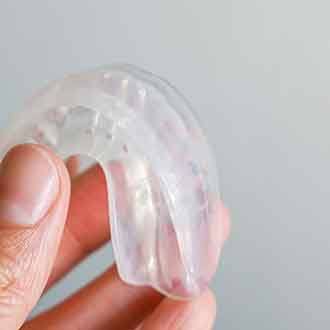
It goes without saying that you should wear a mouthguard while participating in contact sports, like football. But did you know that you should wear one during other physical activities as well, including biking, running, and weightlifting? This will protect your teeth as well as your braces from damage, reducing your chances of experiencing stressful orthodontic emergencies or frustrating treatment plan delays in the process.
Tip: Ask us about having a custom mouthguard made! That way, it fits comfortably and protects both your teeth and your braces.
Orthodontic Emergency FAQs
Will a Toothache Go Away on Its Own?
Toothaches typically warrant a call to your dentist. However, some soreness is to be expected from time to time throughout your orthodontic treatment. For that reason, we recommend doing what you can to alleviate your discomfort at home, including rinsing with warm saltwater and sticking to soft foods. If the sensation persists for several days, then it’s worth getting in touch with us to let us know. Once we know more about your symptoms, including how severe they are, we can determine if it warrants an emergency visit or not.
How Should I Sleep with Tooth Pain?
If the soreness from the movement of your teeth is keeping you up, try using a cold compress, covering any sharp edges of your brackets, wires, or aligners with dental wax, and taking OTC pain medication (as directed) before bed. It’s also a good idea to stick to soft foods at dinner since they don’t require extensive chewing power.
Should I Visit the Emergency Room First for Orthodontic Emergencies?
Visiting the ER is necessary if you’re experiencing potentially life-threatening symptoms, like difficulty breathing or uncontrollable bleeding. Outside of that, it’s not recommended. After all, hospitals rarely have dentists on-staff, so it’s almost certain that they won’t have an orthodontist available to help you. If you have a broken bracket, a protruding wire, or something similar, then call our Holliston office first.
Is a Broken Retainer an Orthodontic Emergency?
A broken retainer is considered an orthodontic emergency. After all, the more time that passes, the more likely it is that orthodontic relapse will occur (when your teeth begin to drift out of their perfectly aligned positions). So, don’t hesitate to call us ASAP! Depending on the severity of the damage, we will recommend either continuing to wear it with the utmost caution or coming to our office to have it repaired or replaced.
Is It Safe to Use A Toothpick?
Since toothpicks can easily become a choking hazard, we don’t recommend using one to remove food particles and other debris from your braces. Instead, rinse your mouth with warm saltwater. Then, use an interproximal toothbrush or pre-threaded floss to gently remove the debris.
What Does Chronic Bad Breath Mean?
Chronic bad breath is often the result of diet, oral hygiene, or an untreated dental problem. If you are struggling with an unpleasant odor on your breath, then try removing garlic, curry, red onions, and other pungent foods from your meals. You should also commit to a solid oral hygiene regimen, including flossing consistently every day. If neither of these changes seems to make a difference, then reach out to your dentist to schedule an appointment.
Tip: Instead of keeping gum on-hand, which can tug on your brackets or attachments, use sugar-free mints! That way, you can keep your breath fresh on-the-go without risking an orthodontic emergency or increasing your chances of tooth decay.
Traditional Braces Clear Braces Self-Ligating Braces Invisalign Pediatric Orthodontics Adult Orthodontics Orthodontic Appliances View Our Services
